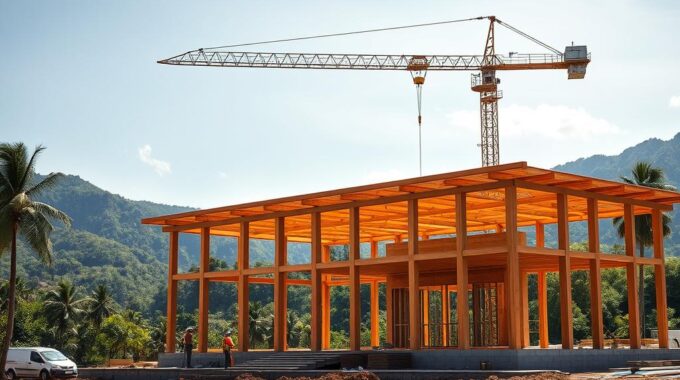"Get a home-improvement-loan-in-ojochal-costa-rica with competitive rates and flexible terms. We connect you with private investors and lenders for financing options."

GAP Equity Loan Opportunities in Costa Rica – Invest Now
Are you a smart real estate investor in Costa Rica? Or maybe you’re a homeowner eager to grow your assets? Check out GAP Equity Loans. They offer financing that can boost your Costa Rican property’s value and expand your investment portfolio.
With GAP Equity Loans, you can get funding from $50,000 to $3,000,000 USD. This lets you use your property’s equity for various investments in Costa Rica’s active real estate scene. These loans feature flexible terms and start at just 12% interest annually. They are your ticket to making the most of your property.
GAP Equity Loans aren’t just about the money. The folks at GAP Investments really know Costa Rica’s real estate business. They can help you make smart moves. Their deep understanding of the market means your investments can be both strategic and informed.
Key Takeaways
- Get competitive finance solutions from GAP Equity Loans in Costa Rica
- Access loans from $50,000 to $3,000,000 USD by using your property’s equity
- Benefit from 12% interest and flexible repayment options
- Tap into GAP Investments’ expertise for successful real estate ventures in Costa Rica
- Seize new investment chances and grow your portfolio
So why wait? Dive into the opportunities that GAP Equity Loans offer in Costa Rica. Boost the value of your property and grow your investment wealth. The future of your portfolio is yours to shape.
Unlock Your Property’s Potential with GAP Investments in Costa Rica
Investing in Costa Rican real estate is a smart choice for investors. You get bigger returns and make your investments diverse. With GAP Investments, you get the right financing for your property. This can be used to grow your real estate collection, improve what you already own, or start new projects. We offer gap equity loans, real estate crowdfunding, and peer-to-peer lending. They’re all designed to help you meet your investment goals.
Get Competitive Financing for Your Costa Rican Real Estate Investments
Our team is skilled in offering foreign property investment and central American financing options. We help you take advantage of the lively Costa Rican real estate market. We have connections to various funding sources. This includes asset-backed lending and cross-border lending. They’re perfect for your expat investing and central American equity financing plans.
Use Your Property’s Equity to Find New Investment Opportunities
You can use the value in your Costa Rican properties for more investment opportunities. Our experts can guide you through obtaining gap equity loans and emerging market loans. They provide access to different loans, including costa rican mortgage loans. These can help you grow and diversify your investments.
Choose from Loans Ranging from $50,000 to $3,000,000 with Flexible Terms
Looking for funds for a small renovation or a big project? Our gap equity loans can provide from $50,000 to over $1,000,000. They come with terms that fit your needs. Find the financing that makes your Costa Rican real estate investments happen.
Earn High Returns, Starting at 12% per Year
GAP Investments offer competitive interest rates from 12% to 16%. Your costa rican real estate investing and alternative lending platforms can bring in big returns. Take advantage of real estate crowdfunding and peer-to-peer lending to make your investments do well.
Work with a Reliable Partner, GAP Investments, in the Costa Rican Market
At GAP Investments, we provide personal service and customized solutions. We help you confidently maneuver through the central American financing options and latin American real estate loans. Our team is here to understand your unique goals. We make sure you get the best gap equity loans and expat investing opportunities for high returns.

GAP Equity Loan Opportunities in Costa Rica
Private Lenders: Flexibility and Personalized Service
Private lenders in Costa Rica offer an exciting option for those wanting to invest in property. They specialize in cross-border mortgages and expat home loans, providing the flexibility we see today. Their deep knowledge of the Central American real estate market is a big plus.
Understanding international lending platforms, they are great partners for buying foreign property or funding retirement housing in Costa Rica.
Competitive Rates and Flexible Terms for Home Equity Loans
GAP Equity Loans is known for its good rates and flexible terms in costa rican real estate financing. They offer private equity lending and home equity loans. These loans can be as small as $50,000 or go into the millions. You can borrow up to half of your property’s value.
This means you can make the most of your property and find new investment opportunities in Central America.
| Metric | GAP Equity Loans | Conventional Banks |
|---|---|---|
| Interest Rates | 12% to 16% | 14.21% |
| Loan Approval Timeline | 7 – 10 business days | 6 months to 1 year |
| Maximum Loan Term | Up to 3 years | Varies |
| Loan Amounts | $50,000 to Millions | Depends on Lender |
| Loan-to-Value Ratio | Up to 50% | Varies |
Teaming up with GAP Equity Loans means getting the right support for your costa rican real estate financing. Whether you’re looking at overseas property investments or expat home loans, they can help.

Navigating Costa Rica’s Real Estate Financing Landscape
We as investors know how crucial it is to understand property financing. This is especially true in Costa Rica’s real estate scene. It offers various ways to finance your investments, crucial for those looking to invest in this budding market.
Understanding Equity Loans in the Costa Rican Market
Equity loans are a top choice for many in Costa Rica. They let investors use the value of their current properties to get more funding. With lenders like GAP Investments, you can get good rates and terms, perfect for boosting your real estate projects.
Advantages of GAP Investments’ Real Estate Financing Solutions
GAP Investments is key in Costa Rica’s finance game, tailored for global investors. They offer loans from $50,000 to $3,000,000+. You can borrow up to 50% of your property’s value with them. The interest rates are fair, between 12% and 16% per year. Plus, the closing costs are about 8% of the loan, making it an enticing offer for your cross-border ventures.
Securing Your Investments with Trustworthy Financing Options
Working with GAP Investments ensures your investment security in Costa Rica. Their lending solutions are designed to help you succeed in your real estate adventures. With their help, reaching your funding goals is more attainable, leading to better returns on your property loans in this market.

| Metric | Range |
|---|---|
| Average Annual Returns | 12% to 16% |
| Loan Amount Range | $50,000 to over $3,000,000 USD |
| Loan-to-Value (LTV) Ratios | Up to 50% |
| Interest Rates for Equity Loans | 12% to 16% per year |
| Closing Costs | Approximately 8% of the loan amount |
Strategies for Maximizing Your Investment Portfolio in Costa Rica
If you’re looking for real estate lending chances in Costa Rica, it’s smart to diversify your portfolio. This can make the most of your foreign investments. Whether you’re moving there or you’re already investing, GAP Investments has new financing choices. These options help increase your returns.
Around 75% of borrowers use us for bridge capital. They need funds for housing or building projects or to get cash out of their properties through loans. Our 3-step process ensures quality when checking out these investment chances in Costa Rica’s real estate.
Our property financing can get you standard loans in just 2 weeks. Normally, it takes 4-6 weeks for other types of loans. We are interested in risks from a level of 3-4 out of 5. This makes us good for many expat investors, aiding in a diverse portfolio in this growing market.
Most of our clients want loans between $100,000 and $2,000,000. We are happy that 92% of our borrowers have no legal problems with their properties. We keep a close watch on your investment. This includes checking on loan payments each month. It’s to help make sure your real estate lending is a long-term success.
| Key Metrics | Figures |
|---|---|
| Percentage of borrowers seeking bridge capital | 75% |
| Number of steps in loan vetting process | 3 |
| Average time to secure standard loans | 2 weeks |
| Risk appetite scale (1-5) | 3-4 |
| Desired loan amounts (USD) | $100,000 – $2,000,000 |
| Percentage of borrowers with clear titles | 92% |

Teaming up with GAP Investments opens up investment doors in Costa Rica. You can confidently grow a diverse portfolio that gives back big. Discover our full range of real estate financing and let us boost your foreign investments in this exciting market.
Conclusion
The costa rican real estate investments world offers many chances for smart investors. They can add variety to their portfolios and benefit from the special central american property financing options. No matter if you have experience with expat mortgage lending or not, Grupo Gap has creative ways for you to better your offshore investment properties.
Grupo Gap has options like vacation home equity loans and tropical retirement portfolios. They meet different needs and risk levels. By focusing on clear, gap equity lending in paradise, they’ve become a dependable choice in Costa Rican real estate.
If you’re starting to boost your investment here, look into Costa Rica Home Equity Loans Guide. By using Grupo Gap’s financing, we can open up exciting offshore investment properties. You can make the most out of your tropical retirement portfolios with their help.
FAQ
What are GAP Equity Loans in Costa Rica?
GAP Equity Loans let you use your property as a way to get cash. You can borrow from ,000 to ,000,000. This type of loan is good for investors and people who own homes in Costa Rica.
What are the benefits of GAP Equity Loans in Costa Rica?
These loans have many good points:– They come with flexible terms.– You get to borrow money from ,000 to ,000,000.– Your property’s equity can become your investment money.– You may earn a return as high as 12% yearly.– You work with GAP Investments, a trusted provider in Costa Rica.
What types of properties are eligible for GAP Equity Loans in Costa Rica?
Many property types can qualify. This includes homes, vacation spots, and even business buildings. They can help you buy new properties or use money from your existing ones.
How can I apply for a GAP Equity Loan in Costa Rica?
Contact GAP Investments to start your application. They will help you fill it out and answer your questions. You’ll need to share details about your property, your plans, and how you handle your money. This process aims to find the best loan for you.
What are the typical loan terms for GAP Equity Loans in Costa Rica?
These loans have a lot of flexibility. For example:– You can borrow from ,000 to ,000,000.– You might get up to 80% of your property’s value.– Your loan can last from 1 to 10 years.– The interest rate starts at 12%.– You can pay it back early without a fee.– They tailor the loan to fit with your property and needs.
Source Links
- https://gapinvestments.com/en/costa-rica-investments/
- https://gapinvestments.com/en/home-equity-lending-in-costa-rica/
- https://www.gapequityloans.com/en/costa-rica-home-equity-loans/
- https://www.gapequityloans.com/en/commercial-loans/
- https://www.gapequityloans.com/en/construction-loans/
- https://www.gapequityloans.com/en/equity-loans-faq/
- https://gapinvestments.com/en/gap-investments-home-equity-loans-costa-rica/
- https://www.gapequityloans.com/en/navigating-property-investment-loans-in-costa-rica/
- https://gapinvestments.com/en/secure-loans-in-costa-rica/
- https://www.gapequityloans.com/en/unlock-opportunities-with-equity-loans-for-costa-rica-investments/
- https://gapinvestments.com/en/about-investment-opportunities-in-costa-rica/
- https://www.gapequityloans.com/en/costa-rica-home-equity-loans-guide/
- https://gap.cr/smart-way-to-use-home-equity-in-costa-rica/
- https://www.gapequityloans.com/en/fulfilling-financial-goals-with-gap-equity-loans-in-costa-rica/
Article by Glenn Tellier (Founder of CRIE and Grupo Gap)



